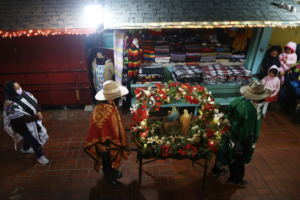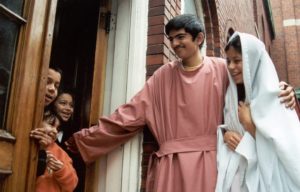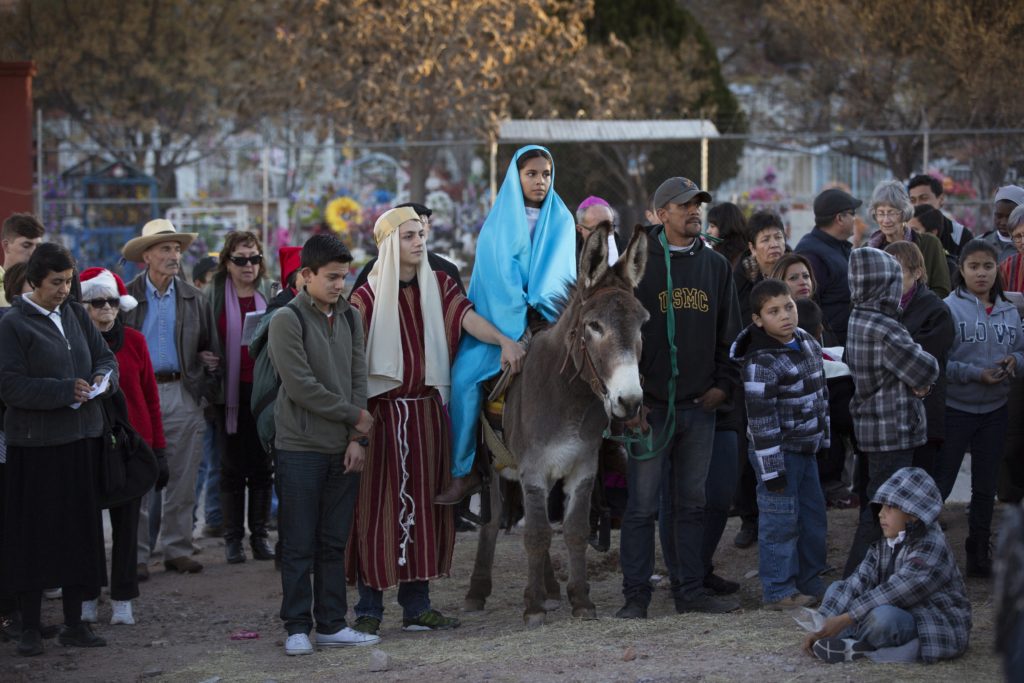Zonia Montano, a longtime parishioner and volunteer coordinator at St. Elizabeth of Hungary Catholic Church in Altadena, can hardly wait for Christmas to arrive.
The list of parish celebrations marking the feast of Our Lady of Guadalupe, the liturgical season of Advent, and the birth of Jesus Christ in Christmas is a long one, but Montano’s enthusiasm really bubbles over when describing how she’ll band together with more than two dozen ministry leaders to help bring las posadas — a centuries-old tradition highlighting Joseph and Mary’s search for lodging prior to Jesus’ birth — to life for her church community to enjoy.
“I am very happy to be involved with the posadas because you can see that the community enjoys it,” said Montano, who’s helped organize St. Elizabeth’s posadas for about five years. “You can see that it brings happiness and unity to the parish.”
Montano is among thousands of Catholics worldwide who will celebrate posadas from Dec. 16-24, a nine-night novena leading up to Christmas that often prompts participants to reflect on how they can prepare to welcome the Christ Child into their hearts and their communities.
“Posada” is the Spanish word for “inn.” The celebration is said to be rooted in a tradition that was started by St. John of the Cross in Spain, spread to the Americas by missionaries, and took hold primarily in Mexico, said Humberto Ramos, parish life director at Epiphany Church in South El Monte.
Although formats vary, posadas typically feature a rosary, a procession, a Mass, and a communal reception.
During the procession, two young people portraying St. Joseph and the Virgin Mary lead a crowd often dressed as shepherds, angels, and pilgrims as they beg door-to-door for shelter using Spanish-language song verses that have been passed down for generations.
After being turned away by several “innkeepers,” just like the Holy Family, the crowd is finally welcomed at the last door. Inside, a celebration ensues that often features a piñata and traditional Mexican treats including pan dulce, tamales, and “champurrado,” a thick hot chocolate drink.

This Advent, parishes across the Archdiocese of Los Angeles will hold various posada-related events as organizers begin to revive gatherings that were scaled back in recent years due to the COVID-19 pandemic.
At St. Elizabeth, posadas are held after the evening Mass on the parish grounds. Each celebration is sponsored by a different church ministry and comes complete with hot chocolate, pan dulce, and “aguinaldos” (“candy bags”) for the children.
At Ramos’ parish, festivities will begin Dec. 16 with a “pastorela” — a Christmas play dating back to the Middle Ages in which shepherds are traveling to visit baby Jesus, but along the way encounter situations reflecting the seven deadly sins.
The play will be followed up by nightly posadas hosted by various parish groups featuring a rosary, procession, and culminating celebration.
At St. Patrick Church in North Hollywood, posadas begin with a large parish-wide celebration and are followed by nightly gatherings in different local neighborhoods. Parishioners are encouraged to invite their friends and neighbors to partake in a street procession, “villancicos” (“carols”), Mass and more.
While posadas can take on a lighthearted air, they are also filled with religious symbolism.
Participants often clutch lit candles while processing in the dark, symbolizing that we are called to be the light of the world, Ramos said. The candies that flow from the broken piñatas symbolize the graces that flow to the community when someone overcomes sin, he said.
And the Holy Family’s quest for help calls us to reflect on our own willingness to assist others in their time of need, he added.
“It’s a great celebration of Advent,” Ramos said. “It’s an expectation of opening our hearts to Christ in the Christmas that is approaching, but also the Christ that will come at the end of time, and the Christ that is very much living among us.”
Posadas can also serve as a way for the faithful to connect with the Nativity story on a personal level, and to spread the gospel in the communities in which they live.
Montano said that posadas provide a tangible daily reminder that Christmas is approaching, building momentum and anticipation inside parishioners.
“You connect to it personally when you hear the songs, you connect to it when you see the images of the Virgin and St. Joseph,” she said. “You connect to it when you see the manger scene set up. Mentally, and spiritually, it helps you prepare for Christmas.”

At St. Patrick, posadas are more than just a cultural or folkloric experience, said the parish’s pastor, Father Nicolás Sánchez Toledano. They are a missionary or an evangelization tool that can be used to strengthen the family unit, help attendees learn more about Jesus, and provide a way for non-churchgoers to connect with the Church outside its walls.
“This is a pastoral act of the St. Patrick’s church community,” he said. “It is the church that is venturing out into the neighborhoods and is made present in the sites in which people live.”
In the U.S., posadas are especially popular in Latino communities, particularly among Mexican immigrants who are nostalgic for their homeland and want to share the tradition with their children, Ramos said.
The Holy Family’s search for lodging can also resonate among some Latino immigrants trying to carve out a new life in a foreign country.
“I think for many Latino Catholics whose lives have been affected by immigration it’s a reminder of the hospitality that they’ve received themselves to some degree, as well as the spirit of welcome that Catholics are called to offer newcomers,” said Jennifer Owens-Jofré, an assistant professor in the department of theological studies at Loyola Marymount University.
In the Archdiocese of Los Angeles, participants say, the posada tradition is indeed gaining traction among first- and second-generation Mexican-Americans, but it’s also becoming a part of popular Catholic practice and culture overall.
For Montano — who was born in Guatemala and came to the U.S. as a child — helping stage her parish’s annual posadas has given her new insight into the tradition, as she did not celebrate them growing up.
Montano first experienced posadas as an adult while visiting her husband’s family in Guanajuato, Mexico, and after years of attending and planning these gatherings now feels privileged to be able to bring them to her church community each December.
“It is a very beautiful tradition,” she said. “If you come to this country as a child and you didn’t learn about these traditions in your country of origin, but to have the opportunity to learn about them and experience them here it helps both you and the next generation.”

